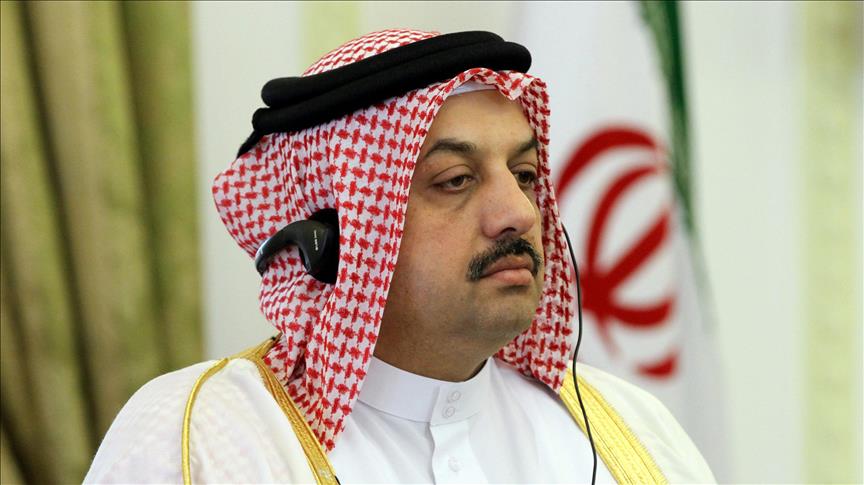Lifting siege comes before dialogue: Qatar
Qatar has been reeling under a blockage imposed by four Arab states since last month
 FILE PHOTO - Qatar's Defense Minister Khalid bin Mohammed al-Attiyah
FILE PHOTO - Qatar's Defense Minister Khalid bin Mohammed al-Attiyah
By Ahmed al-Masri
DOHA
Qatar's Defense Minister Khalid bin Mohammed al-Attiyah has conditioned the lifting of a blockage imposed on his country by four Arab states before engaging in any dialogue with its neighbors.
Qatar has been reeling under a blockage imposed by Saudi Arabia, Egypt, the United Arab Emirates (UAE) and Bahrain since last month.
The four states accuse Doha of interfering in their affairs and supporting terrorism, a claim dismissed by Qatar, which contends that the blockade was in violation of international law.
“Lifting the siege should precede any dialogue,” al-Attiyah said in an interview with Russia Today, excerpts of which was published by Qatar’s official news agency on Tuesday.
"If the blockade countries remain reluctant to lift the siege, Qatar will be compelled to resort to the available international legal procedures to lift it," he said.
The Qatari minister ruled out the relocation of the Al-Udeid U.S. military base from his country.
"The US-Qatari relations are strong," he said, going on to deny that the “acceleration of the deployment of Turkish troops in Qatar was in anticipation of any military escalation against Doha."
“The Turkish and U.S. military presence in Qatar doesn’t pose any kind of sensitivity, at all," he said.
The Qatar minister argued that the blockade states have relied in their escalation on U.S. President Donald Trump’s Twitter postings.
“[They forgot that the U.S. is a country of institutions, most of which is the Department of State, which has explicitly supported the Qatari’s position," he said.
Shortly after the four Arab states cut diplomatic ties with Qatar, Trump appeared to take credit for the move.
"So good to see the Saudi Arabia visit with the King and 50 countries already paying off. They said they would take a hard line on funding extremism, and all reference was pointing to Qatar. Perhaps this will be the beginning of the end to the horror of terrorism!" Trump wrote on Twitter.
As for Qatar’s participation of in the Saudi-led air campaign against Yemen’s Houthi rebels, which ended with the start of the crisis on June 5, al-Attiyah said "despite our belief that the Yemeni crisis could be resolved politically without exclusion of any party, but Doha participated on the basis of defending our brothers”.
"Qatar recognizes that (former Yemeni President) Ali Abdullah Saleh and the Houthis have posed a threat to Saudi Arabia," he said.
"But, it is impossible to work with a party that has hidden agendas in Yemen, since they are fighting Saleh and hosting his son on their land," he said in an implicit reference to the UAE.
Ahmed Ali Abdullah Saleh, a former Yemeni ambassador to the UAE, is still based there since he was sacked of his post in 2015 by current President Abd Rabbuh Mansour Hadi.
Al-Attiyah, during the interview, thanked Iran for opening its airspace for Qatari planes and supplying some food to the local market.








